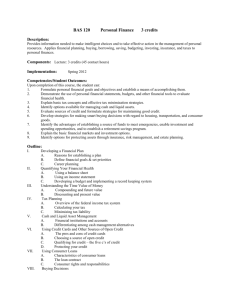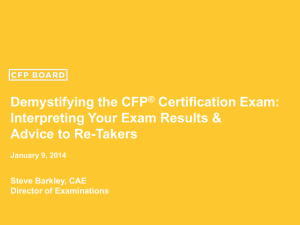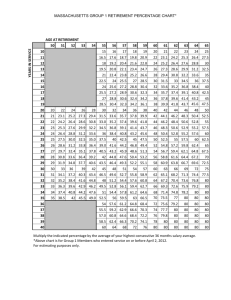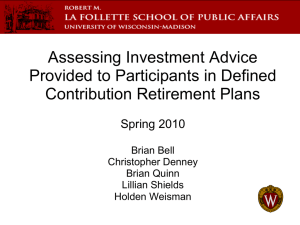4854
advertisement
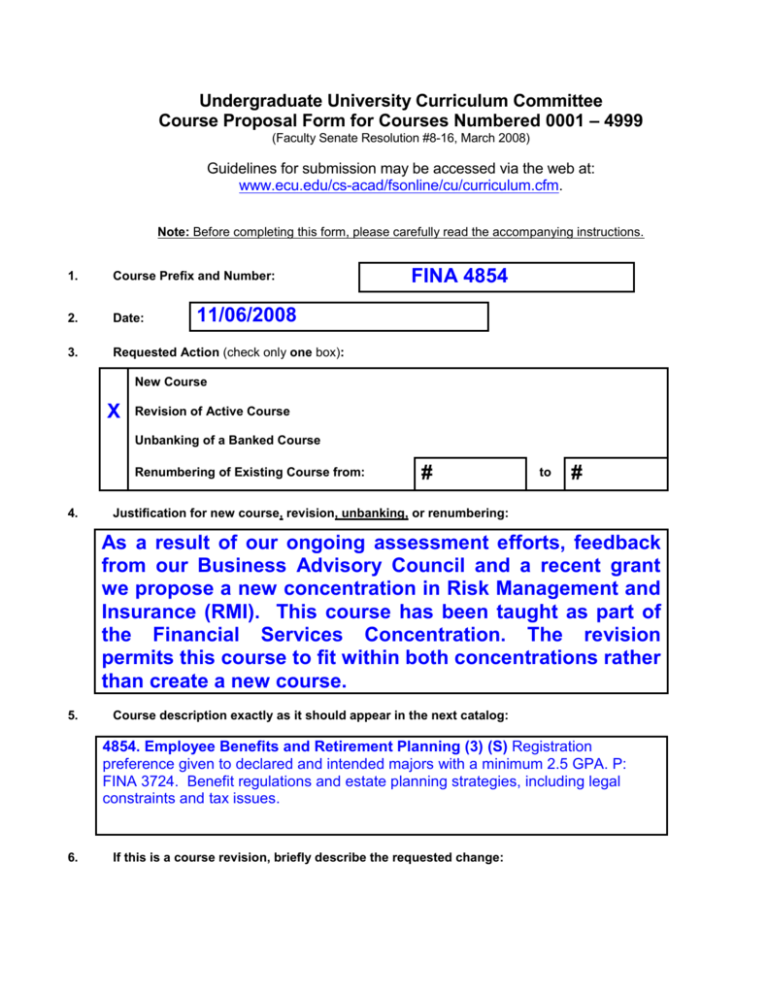
Undergraduate University Curriculum Committee Course Proposal Form for Courses Numbered 0001 – 4999 (Faculty Senate Resolution #8-16, March 2008) Guidelines for submission may be accessed via the web at: www.ecu.edu/cs-acad/fsonline/cu/curriculum.cfm. Note: Before completing this form, please carefully read the accompanying instructions. 1. Course Prefix and Number: 2. Date: 3. Requested Action (check only one box): FINA 4854 11/06/2008 New Course X Revision of Active Course Unbanking of a Banked Course Renumbering of Existing Course from: 4. # to # Justification for new course, revision, unbanking, or renumbering: As a result of our ongoing assessment efforts, feedback from our Business Advisory Council and a recent grant we propose a new concentration in Risk Management and Insurance (RMI). This course has been taught as part of the Financial Services Concentration. The revision permits this course to fit within both concentrations rather than create a new course. 5. Course description exactly as it should appear in the next catalog: 4854. Employee Benefits and Retirement Planning (3) (S) Registration preference given to declared and intended majors with a minimum 2.5 GPA. P: FINA 3724. Benefit regulations and estate planning strategies, including legal constraints and tax issues. 6. If this is a course revision, briefly describe the requested change: The revision places less emphasis on design of employee benefit plans and more on the contents of employee benefit plans and considered and substance of estate planning strategies. 405 7. Page Number from current undergraduate catalog: 8. The Writing Across the Curriculum Committee must approve Writing Intensive (WI) Credit for all courses prior to their consideration by the UCC. If WI credit is requested, has this course been approved for Writing Intensive (WI) credit (yes/no)? If Yes, will all sections be Writing Intensive (yes/no)? No 1. 10. The Academic Standards Committee must approve Foundations Curriculum Credit for all courses prior to their consideration by the UCC. If FC credit has been approved by the ASC, then check the appropriate box (check at most one): English (EN) Science (SC) Humanities (HU) Social Science (SO) Fine Arts (FA) Mathematics (MA) Health (HL) Exercise (EX) Course Credit: Lecture Hours Weekly or Lab Weekly Studio 45 3 s.h. Per Term Credit Hours or Per Term Credit Hours s.h. Weekly or Per Term Credit Hours s.h. Practicum Weekly or Per Term Credit Hours s.h. Internship Weekly or Per Term Credit Hours s.h. Total Credit Hours s.h. Other (e.g., independent study): 11. Anticipated yearly student enrollment: 12. Affected Degrees or Academic Programs: 50 Degree(s)/Course(s) Catalog Page Finance Concentration in Risk Management and Insurance 13. Change in Degree Hours 191,192 Overlapping or Duplication with Affected Units or Programs: X Not Applicable Applicable (Notification and/or Response from Units Attached) 14. Approval by the Council for Teacher Education (required for courses affecting teacher education programs): x Not Applicable Applicable (CTE has given their approval) 15. Instructional Format: please identify the appropriate instructional format(s): X 16. Lecture Internship Lab Studio Student Teaching Clinical Correspondence Honors Seminar Colloquia Practica Other Statements of Support: X Current staff is adequate Additional Staff is needed (describe needs in the box below): X Current facilities are adequate Additional Facilities are needed (describe needs in the box below): X Initial library resources are adequate Initial resources are needed (in the box below, give a brief explanation and estimate for cost of acquisition of required resources): X Unit computer resources are adequate Additional unit computer resources are needed (in the box below, give a brief explanation and an estimate for the cost of acquisition): X ITCS Resources are not needed Following ITCS resources are needed (put a check beside each need): Mainframe computer system Statistical services Network connections Computer lab for students Describe any computer or networking requirements of this program that are not currently fully supported for existing programs (Includes use of classroom, laboratory, or other facilities that are not currently used in the capacity being requested). Approval from the Director of ITCS attached 17. Syllabus – please insert course syllabus below. Do not submit course syllabus as a separate file. You must include (a) the name of the textbook chosen for the course, (b) the course objectives, (c) the course content outline, and (d) the course assignments and grading plan. (a) COURSE OBJECTIVES: 1. Students should be able to demonstrate an understanding of the basic principles of estate and retirement planning. 2. Students should be able to demonstrate the use and application of pension plans, other savings methods, wills, trusts, estates, as well as taxation considerations. 3. Students should be able to explain and discuss the legal problems that exist in estate and retirement planning decisions. 4. Students should be able to recognize and analyze estate and retirement planning decisions and employ the appropriate management techniques for such problems. (b) COURSE GOALS: Each student will study financial, business and legal analyses and information and their uses in decision-making regarding employee benefits and individual retirement planning. First, each student will know and use fundamental information and analyses of employee benefit plans and estate and retirement planning. This information and analyses include welfare benefit and retirement plans, retirement planning, wills, trusts, and federal tax principles. Second, each student will understand the impact of employee benefit plans, retirement planning and estate planning on individuals and their spouses and dependents. Third, each student will use financial, legal, business and other analyses and information to analyze employee benefit plans and to find solutions and opportunities in designing or making retirement and estate plans. The Course Goals implement the Course Objectives above. (c) TEXTBOOKS, STUDY GUIDES, AND SUPPLEMENTS: 1. David A. Littell & Kenn Beam Tacchino, Planning for Retirement Needs, 9th ed., The American College, Bryn Mawr, Pennsylvania, 2008, ISBN: 978-1932819441. 2. Constance J. Fontaine, Editor, Fundamentals of Estate Planning, 11th ed., The American College, Bryn Mawr, Pennsylvania, 2008, ISBN: 978-1932819571. (d) COURSE GRADING :The scale is as follows: A = 100-90, B = 89-80, C = 79=70, D = 69-60, and F = Below 60. (e) EXAMINATIONS AND COURSE WEIGHTS FOR ASSIGNMENTS: The course requires two (2) examinations (exam). All examinations consist of multiple-choice and essay questions. The multiple-choice questions cover employee benefits and retirement planning information. The essay problems cover analysis and information for employee benefit administration and retirement planning problems. Each examination is worth one hundred points. The grading summary is as follows: Examination (2) 40% (Multiple-Choice and Essay) Business Cases (2) 25% (Written Reports & Presentations) Final Examination (1) 25% (Multiple-Choice and Essay) Class Participation (2 or more) 10% (Discussions & Attendance) Your final course grade is a weighted average of examinations, business cases, final examination and class participation.

